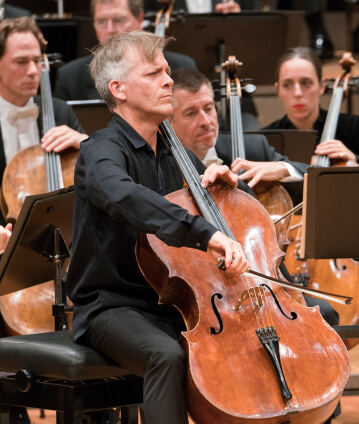Sakari Oramo and Alban Gerhardt

Two fabulous, mythical travel stories from Scandinavia are on the programme in this concert: Edvard Grieg’s Peer Gynt Suite No. 1 and Jean Sibelius’ Lemminkäinen Suite. Between these two works will be the European premiere of the Cello Concerto by Brett Dean, one of the most sought-after composers of our time and former violist with the Berliner Philharmoniker. The conductor is Sakari Oramo, who currently heads the BBC Symphony Orchestra. The soloist is Alban Gerhardt.
His sound is unmistakable, and his interpretations are characterised by spontaneity and originality: after early success in competitions, cellist Alban Gerhardt made his debut with the Berliner Philharmoniker when he was 21 years old. His international career has led him to perform with nearly 250 orchestras around the world. “When playing,” he says, “I always take risks. [...] Although I have a concept of what I play, I am sometimes surprised by the outcome.” Born in Berlin, he works together with many contemporary composers such as Jörg Widmann, Matthias Pintscher and Osvaldo Golijov. In concerts with the Philharmoniker in May 2014, he was the soloist in Unsuk Chin’s cello concerto which the Korean composer dedicated to him. Now, Alban Gerhardt will premiere the new Concerto for Cello and Orchestra by Brett Dean, commissioned by the Berliner Philharmoniker together with four other partners.
The conductor is Sakari Oramo, who began his musical career as a violinist and concertmaster of the Finnish Radio Symphony Orchestra, before training as a conductor under Jorma Panula at the Sibelius Academy. The Australian musician Brett Dean, who played the violin at the age of eight in the Queensland Youth Orchestra before taking up the viola, was a member of the Berliner Philharmoniker from 1985 to 2000. During this time, he discovered the improvisation that paved the way to him becoming a composer. Today, Brett Dean appears worldwide as a soloist, chamber musician and conductor. He has received commissions from the Amsterdam Concertgebouw Orchestra, the Los Angeles Philharmonic, the BBC Proms, the Lucerne Festival and others.
Sakari Oramo continues the programme after the interval with Jean Sibelius’s Lemminkäinen, named after the eponymous hero of the Finnish national epic, Kalevala. The music traces the experiences of this “Achilles of Finnish mythology” (Sibelius), with the second of the four episodes taking us to Tuonela, the dark realm of Finnish mythology: to prevent the dead from returning to the realm of the living, the land was surrounded by torrential waters where a singing swan is to be found. As befits the bleak and wan atmosphere of the realm of the dead, Sibelius’s ʻsettingʼ largely forgoes bright sound components, and reproduces the song of the swan with an elegiac theme on the cor anglais.
© 2018 Berlin Phil Media GmbH
Related interviews